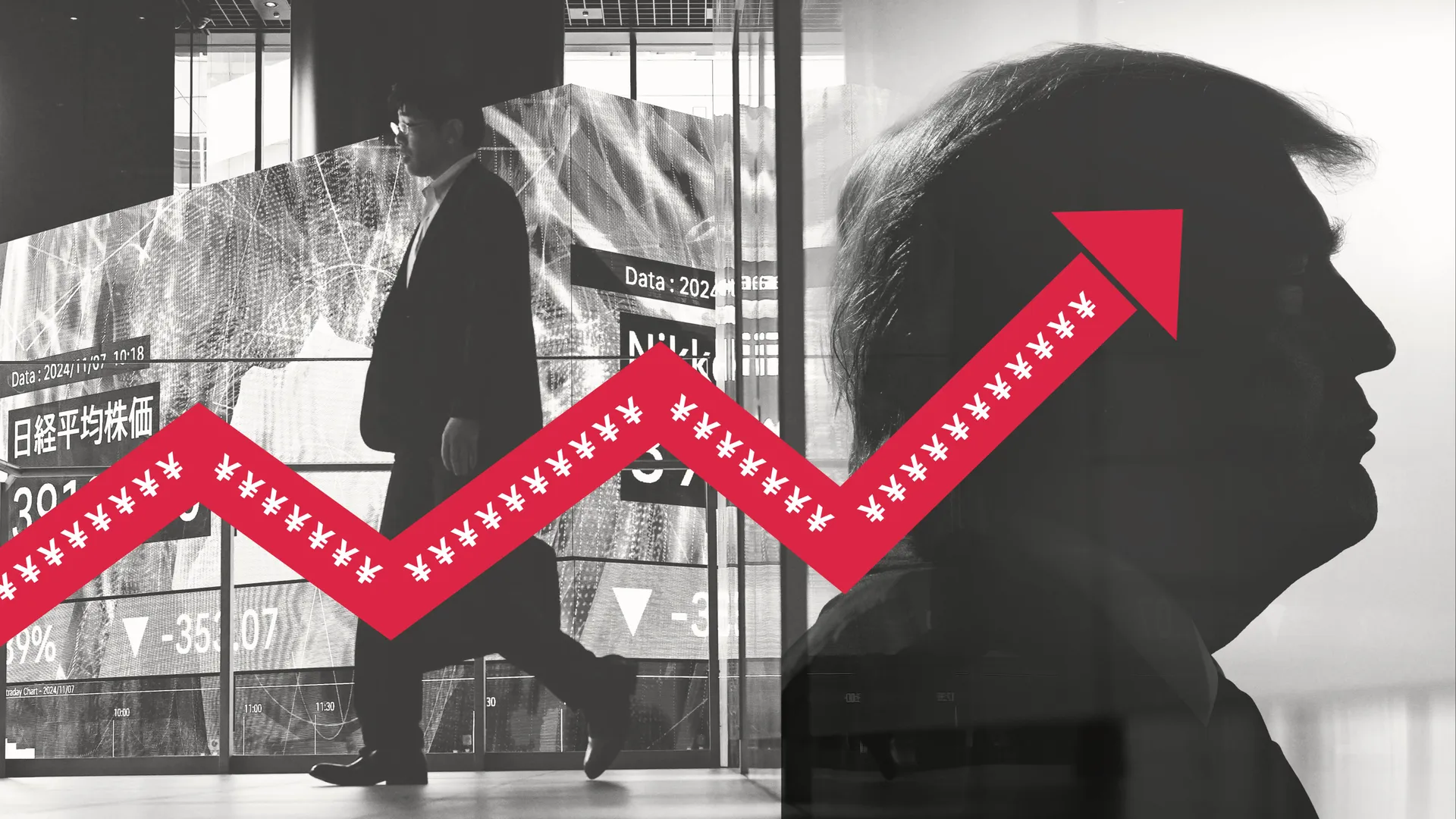尊敬的用户您好,这是来自FT中文网的温馨提示:如您对更多FT中文网的内容感兴趣,请在苹果应用商店或谷歌应用市场搜索“FT中文网”,下载FT中文网的官方应用。


Within a few hours of Donald Trump securing his victory in the US, Japanese media was using the term matatora — the third Trump-related entry in Japan’s dictionary of escalating disquiet at his possible return.
唐纳德•特朗普(Donald Trump)在美国取得胜利后几小时内,日本媒体就开始使用“matatora”一词,这是日本对于特朗普可能再次当选而日益加剧的不安所相关的词典中,与之有关的第三个词条。
The first word in the sequence, moshitora (“what if Trump”), was current in the latter months of 2023 and set a tone of background nervousness in government, corporate and market circles. The second, hobotora (“most likely Trump”), has been in widespread use this year, demanding more serious fretting around geopolitics, inflation and trade risk. Matatora (“Trump is back”) grants a general licence to gasp.
这个序列中的第一个词moshitora,“如果特朗普获胜会怎么样”,是2023年最后几个月出现的,为政府、企业和市场界的紧张情绪定下了基调。第二个词“hobotora”,“很可能是特朗普”,在今年被广泛使用,要求人们加大对地缘政治、通货膨胀和贸易风险的担忧。Matatora,“特朗普回来了”,则为人们发放了倒吸一口气许可证。
For some, though, the word has unleashed a bullish snort and an argument that — absent embroilment in regional conflict or some other unforeseen calamity — Japan may be better placed than almost any other developed market outside the US to flourish over the next few years.
不过,对于一些人来说,这个词会让他们发出满意的声音,他们认为,如果没有卷入地区冲突或其他不可预见的灾难,日本可能比美国以外的几乎任何其他发达市场都更有条件在未来几年蓬勃发展。
Tokyo stocks, declares Neil Newman, a strategist who has been covering Japan since the 1980s, have rarely been so primed for ignition. If anything, he says, the political paralysis to emerge from Japan’s messy general election last month, and the implied guarantee of no bad policymaking, should only make the market more attractive to big global funds.
自20世纪80年代起就开始研究日本市场的策略师尼尔•纽曼(Neil Newman)认为,东京股市从未像现在这样蓄势待发。他说,如果说上个月日本混乱的大选造成了政治瘫痪,以及隐含着不会出现糟糕决策的保证,那么这只会让该市场对全球大型基金更具吸引力。
It is a beguiling argument, given an extra sparkle by the various volatile knee-jerk market moves in Tokyo that accompanied Wednesday’s news: gains for exporters (on assumptions of an even weaker yen), defence industry stocks (Trump will demand allies spend more on their militaries), banks (inflation will rise and so will interest rates) and companies that stand to benefit from the (probably accelerated while Trump is in power) reshoring of Japan’s semiconductor industry.
这是一个引人入胜的论点,而伴随着周三的新闻,东京市场所出现的各种不稳定的膝跳式走势,为这一论点增添了额外的光彩。这包括出口商上涨——假设日元将进一步走弱;国防工业股上涨——特朗普将要求盟国增加军费开支;银行上涨——通胀率将上升,利率也将随之上升;以及将受益于日本半导体产业回流的公司——特朗普执政期间可能会加速。
Nicholas Smith, a strategist at CLSA, also sees the prospect of a six-month boost for Japan as animal spirits lift the financial sector. Global capital spending, frozen in the run-up to the US election, should now thaw quickly, favouring Japan.
里昂证券(CLSA)策略师尼古拉斯•史密斯(Nicholas Smith)也认为,随着动物精神提振金融业,日本有望在六个月内获得提振。在美国大选前夕冻结的全球资本支出现在应该迅速解冻,有利于日本。
The longer-term case for Japanese equities under Trump, though, depends on two main lines of reasoning. The first is that Shanghai and Hong Kong’s loss will be Tokyo’s gain. US-China relations under the Biden administration have not been good, and there is reason to expect them to worsen under Trump. US pension funds have already come under pressure to stop or withdraw investment, while China-based dealmaking led by US private equity has all but fallen silent. Some US pension money may have returned to Hong Kong and China in recent months, but that could quickly reverse under Trump. Critically, the flows may well divert to Japan by default as the only developed market in Asia with the breadth and depth to absorb them.
不过,特朗普执政时期日本股市的长期走势取决于两个主要推理。首先,上海和香港的损失将是东京的收益。拜登政府时期的中美关系并不好,有理由预计特朗普执政时期会进一步恶化。美国养老基金已经面临停止或撤出投资的压力,而以美国私募股权基金为首的中国交易则几乎陷入沉寂。最近几个月,一些美国养老金资金可能已经返回香港和中国,但在特朗普执政期间,这种情况可能会迅速逆转。至关重要的是,这些资金很可能默认流向日本,因为日本是亚洲唯一一个在广度和深度上都能吸收这些资金的发达市场。
A second argument is that Japan’s recent descent into political stasis — the ruling Liberal Democratic party and its leader, Shigeru Ishiba, have yet to pull together a working government — is not, for the stock market, a big problem. Ishiba and his party are too weak to disturb the economy’s momentum, or unravel the progress on corporate governance reform and restructuring that appeals so strongly to foreign investors.
第二个论点是,日本最近陷入政治僵局,执政的自民党及其领导人石破茂尚未组建一个有效的政府,对股市来说这并不是一个大问题。石破茂和他的政党过于软弱,无法扰乱经济的发展势头,也无法破坏公司治理改革和重组所取得的进展,而这些进展对外国投资者有着强烈的吸引力。
There are clearly powerful counter-cases to all this, not least the chance that the Trump administration is associated with such elevated levels of geopolitical uncertainty that investors retreat to the sort of trading patterns that flee risk and tend to reduce exposure to Japan.
显然,所有这一切都存在强有力的反证,尤其是特朗普政府有可能导致地缘政治不确定性升高,以至于投资者退缩到逃避风险并倾向于减少对日本敞口的交易模式。
And though Japan may indeed be geared to global growth, a significant chunk of that is exposure to China. Even if Japanese companies can navigate their way through higher tariffs and intensified “pick-a-side” rhetoric from Washington, China itself could be far less rewarding than in the past.
尽管日本可能确实面向全球增长,但其中很大一部分是对中国的敞口。即使日本公司能够应对更高的关税和华盛顿加剧的“选边”言论,中国本身的回报也可能远不如过去。
On the political front, the risks around Ishiba’s dismal gamble on a general election could prove much greater than Newman and other bulls suppose. The price paid for the prime minister’s weakness — an inability to communicate Japan’s importance to Trump, or present himself as likely to be around long enough to be worth Trump caring about — will be high.
在政治方面,石破茂在大选上的惨淡赌博所带来的风险可能比纽曼和其他看涨者想象的要大得多。这位首相的弱点所付出的代价将是巨大的,其弱点是:无法向特朗普传达日本的重要性,或无法表现出自己有可能长期存在,值得特朗普关心。
Since early 2024, when the Nikkei 225 Average finally surpassed the record set in 1989, the brokers’ mantra has been that Japan is Back. A succession of big US and European long-only funds have come to Tokyo to check for themselves that the sales pitch holds true. A growing number appear to have returned convinced but without the sort of comfort levels needed for a really big reallocation to Japan. They had in any case been holding fire until after the US election.
自2024年初日经225指数终于超过1989年创下的纪录以来,券商的口头禅一直是“日本回来了”。美国和欧洲的大型多头基金接连来到东京,亲自验证这一宣传是否属实。越来越多的基金似乎深信不疑地回来了,但却没有达到真正大规模重新配置到日本所需的舒适水平。它们在美国大选之前一直坚定地按兵不动。
Trump is Back may ensure that Japan stays Back. It may also set Japan way, way back.
特朗普的回归可能会确保日本的回归,但也可能让日本倒退。